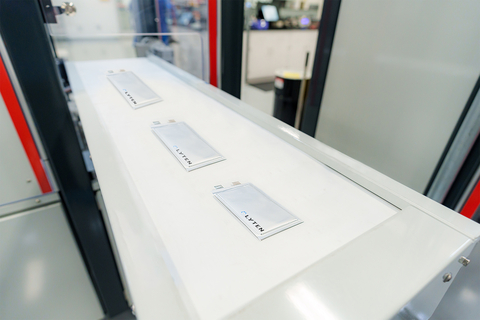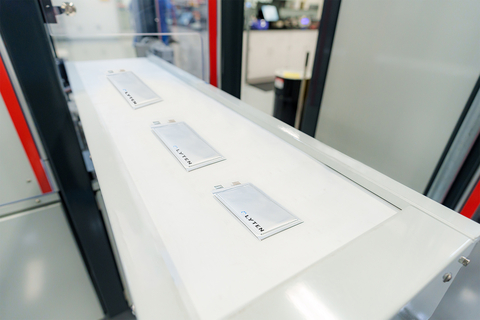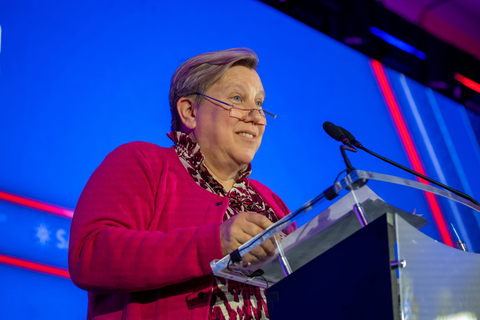SAN JOSE, Calif.--(BUSINESS WIRE)--Lyten, the supermaterial applications company and global leader in lithium-sulfur battery technology, today announced it has shipped A samples of its 6.5 Ah (C/3 discharge rate, 25° C) lithium-sulfur pouch cells to Stellantis and other leading US and EU automotive OEMs for evaluation. This milestone further demonstrates Lyten’s global leadership in lithium-sulfur manufacturing, a battery chemistry with the potential to hold more than two times the energy density of lithium-ion and starts the clock for commercial evaluation and adoption by multiple industry leaders.
Lyten manufactures lithium-sulfur cells in both pouch and cylindrical formats (2170 and 18650) and is currently shipping the 6.5 Ah pouch cell format for customer evaluation. Later this year, Lyten plans to deliver cylindrical A samples for evaluation. Lyten’s lithium-sulfur format flexibility enables its use in a wide range of industries beyond automotive, including space, aerospace, drones, micromobility, defense and consumer electronics.
Lyten has already shipped samples to a major US consumer electronics company, plans to deliver cells to the Department of Defense in May, and targets delivery of samples to more than 20 potential customers for commercial evaluation in the 2Q and 3Q 2024. Lyten is currently on target to deliver commercial use cells to aerospace and defense customers this year.
“This milestone is the result of years of dedicated work and innovation from the Lyten team, and we are just at the start of further expanding the capabilities of our lithium-sulfur battery cells,” said Dan Cook, Lyten CEO and Co-Founder.
The lithium-sulfur A samples are produced on Lyten’s automated pilot line in San Jose, CA, which opened in May 2023. The pilot line is built with standard lithium-ion equipment and manufacturing practices, proving the scalable manufacturability of Lyten’s lithium-sulfur cells. The San Jose production line will deliver B samples for Auto OEMs and commercial cells for smaller quantity, non-EV customers. Lyten’s first giga-scale facility is currently being designed with Turner Construction and SSOE to manufacture automotive C samples and beyond.
“The world needs a practical, mass market battery, and that is what we are building with our lithium-sulfur technology,” stated Celina Mikolajczak, Chief Battery Technology Officer at Lyten. “Mass market electrification and net zero goals demand higher energy density, lighter weight, and lower cost batteries that can be fully sourced and manufactured at massive scale using abundantly available local materials. That is Lyten’s lithium-sulfur battery.”
Lithium-Sulfur is considered a leapfrog battery technology with the potential to deliver two times the energy density of current NMC batteries, but with a materials and manufacturing cost competitive with low cost LFP. The Li-S cathode is made of widely abundant sulfur and Lyten’s proprietary 3D Graphene, sourced by capturing carbon from methane. This eliminates the need for critical minerals like nickel, cobalt, and manganese in the cathode. The Li-S anode is a lithium metal composite, eliminating the need for graphite. The elimination of critical minerals means a projected 65%+ lower carbon footprint than lithium-ion batteries and a supply chain that can be fully sourced in the US or EU at scale.
Lyten has raised more than $410M in equity capital to date, including investments from Stellantis, FedEx, Honeywell, Walbridge, and Prime Movers Lab. In February 2024, Chrysler announced the inclusion of Lyten’s Li-S batteries in its Halcyon concept EV.
Please go to www.lyten.com/contact-us/ to enquire about joining the waitlist for Lyten’s lithium-sulfur battery samples and spec sheet.
About Lyten
Lyten is a supermaterial applications company. Lyten’s proprietary processes permanently sequester carbon from methane in the form of 3D Graphene and utilize the tunable supermaterial to develop decarbonizing applications. Lyten is currently developing and commercializing next-generation lithium-sulfur batteries for use in the automotive, aerospace, defense, and other markets; a next-generation polymer composite that can reduce the amount of plastic used by up to half while maintaining structural and impact strength; and next-generation sensors that significantly increase detection sensitivity and selectivity for use in automotive, industrial, health, and supply chain applications.
Lyten, founded in 2015, is led by a group of experienced executives from across automotive, energy, batteries, semiconductors, manufacturing and defense. The company lists more than 415 patents granted or pending and is currently manufacturing Lyten 3D Graphene material and its applications in San Jose, California.





